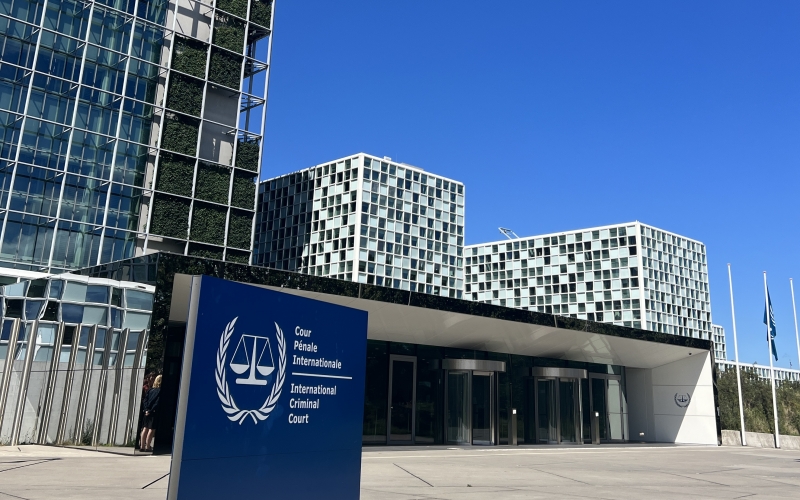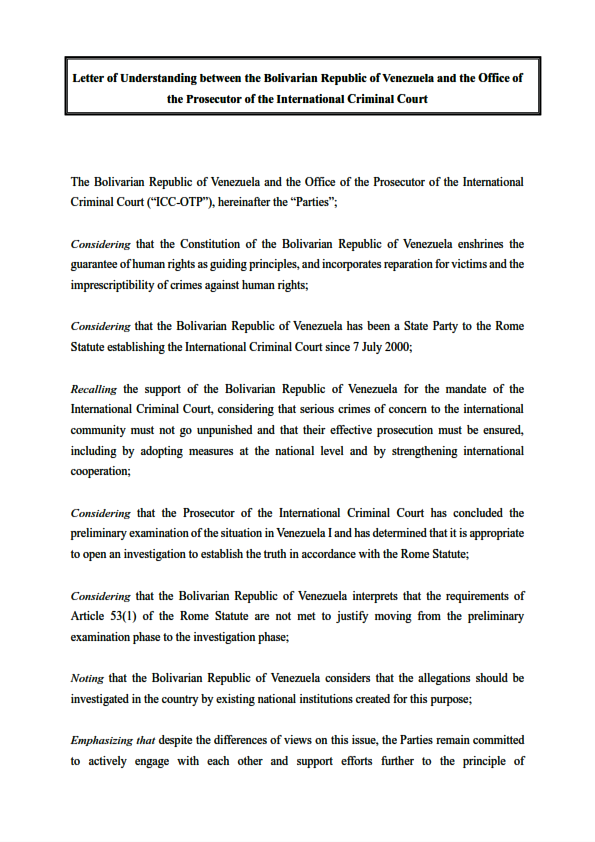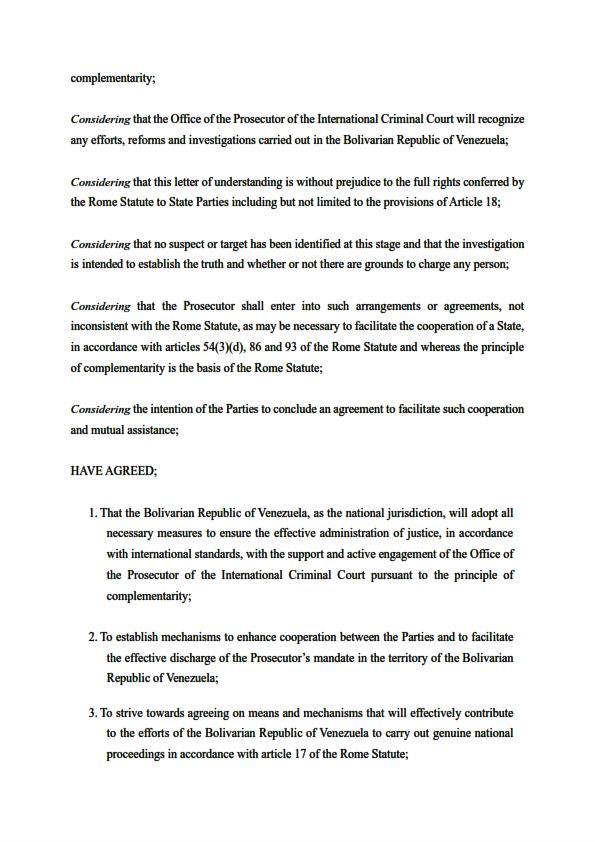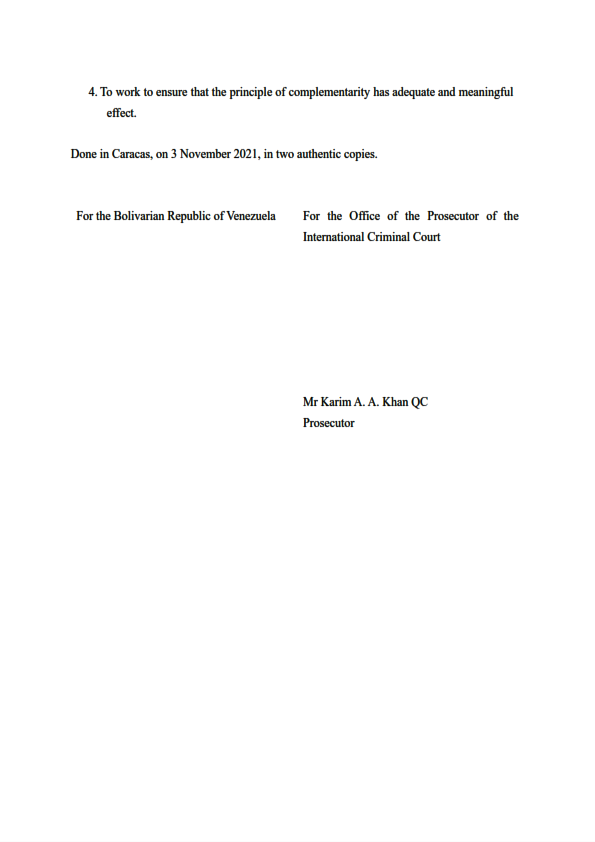ICC judges confirm decision authorising the resumption of the investigation in the Venezuela I situation

On 1 March 2024, the International Criminal Court (ICC) Appeals Chamber delivered its judgement in the appeal of the Bolivarian Republic of Venezuela against the June 2023 decision authorising the ICC Prosecutor to resume his investigation in the situation in Venezuela I. The Appeals Chamber unanimously confirmed the Pre-Trial Chamber I (PTC I)’s “decision authorising the resumption of the investigation” of 27 June 2023, and rejected all six of grounds of appeal submitted by Venezuela. The ICC Office of the Prosecutor (OTP) can thus continue with its investigation in the situation of Venezuela I.
A summary of the judgement was delivered by Judge Marc Perrin de Brichambaut, Presiding Judge, during a public hearing at the seat of the Court in The Hague (The Netherlands), in the presence of the Office of the Prosecutor, the Representatives of the Bolivarian Republic of Venezuela and the Office of Public Counsel for Victims (OPCV), and was also webcast (in English, French and Spanish).
CIVIL SOCIETY REACTIONS #NGOVoices:
Read below reactions by civil society on the resumption of the ICC investigation of the Venezuela I situation, #NGOVoices:
In a video statement analyzing the decision, Alí Daniels, co-director of Accesso a la Justicia stated that “it is a day that the victims must celebrate because it is a day of justice. In a process as complicated as that of international justice, the fact that today what the victims have been saying for years has been confirmed is a great victory for them. The fact that the victims have been heard and their rights have been acknowledged cannot be overlooked in celebration.”
"The decision is undoubtedly another victory on the road to justice, truth, healing, and reconciliation in Venezuela. For the victims and Venezuelan society, having an objective and transparent process is an experience that reinforces the desire to overcome the crisis and conflict through democratic and institutional means,” said Centro de Justicia y Paz (CEPAZ). “Now we await the Office of the Prosecutor’s progress in determining responsibilities and presenting cases in order to demonstrate that the State lacks the will and capacity to investigate and redress the crimes against humanity committed."
The Comité de Víctimas de Crímenes de Lesa Humanidad welcomed “the decision as a significant victory in the fight against impunity for crimes committed in the country since 2014,” and noted that "[t]his year, the monitoring, documentation, and support to victims by civil society will continue to be an essential aspect in the pursuit of justice."
Defiende Venezuela, Observatorio de Crímenes de Lesa Humanidad and Un Mundo Sin Mordaza highlighted that "this progress also reflects the importance of international cooperation in the pursuit of justice and in the protection of human rights worldwide. In this regard, our call to the international community must be reaffirmed to continue supporting efforts aimed at promoting justice and accountability."
"There is still a lot of road to travel, but ultimately it is very good news for human rights defenders and victims of crimes against humanity in Venezuela,” reflected Alfredo Romero Mendoza, Executive Director of Foro Penal.
"The unanimous decision by the Appeals Chamber of the International Criminal Court allowing the continuation of the investigation into crimes against humanity committed in Venezuela is of the utmost importance for at least three reasons,” said Carolina Jimenez Sandoval, President of the Washington Office on Latin America (WOLA). In a video statement, she further outlined several reasons why the decision is important.
“Civil society in Venezuela has played a crucial role in supporting access to justice for victims of Rome Statute crimes. Human rights defenders (HRDs) and civil society face serious threats and reprisals directed against themselves, their families and their colleagues for their work on justice and for cooperating with the Court.”, stated Virginie Amato, Advocacy Director at the Coalition for the ICC. “ICC States Parties, the Assembly of States Parties (ASP) as a whole and the Court should remain vigilant and continue to protect and defend civil society space and HRDs, in Venezuela and globally” she added.
“The ICC's decision to continue the investigation into the grave human rights violations in Venezuela, and to reject the State's appeal, is a victory for the victims of repression and for the organizations that seek justice and fight for truth and reparations in the country. It is a light of hope for those who have been documenting for years the serious human rights violations committed by the government and accompanying the victims of arbitrary detentions, torture, persecution, threats and other serious crimes,” expressed Civil Rights Defenders.
The International Commission of Jurists (ICJ) welcomed the decision and encouraged “the international community to continue supporting accountability for gross human rights violations that constitute international crimes and calls on the authorities of Venezuela to cooperate in good faith with international mechanisms.”
The International Federation for Human Rights (FIDH) and the Venezuelan Program for Education-Action on Human Rights (PROVEA) stated that “In a context marked by the dismantling of the rule of law in the country and a new wave of persecution against all dissident voices, the ICC’s response is an important turning point, as it allows for the investigation of serious violations of human rights and international criminal law committed by the Maduro regime to move forward."
“The ICC decision today is a beacon of hope for the victims of systematic human rights violations by the Maduro Government,” said Michelle Reyes Milk, Senior Counsel at the International Justice Program of Human Rights Watch.
BACKGROUND ON THE SITUATION IN VENEZUELA I
Venezuela ratified the Rome Statute on 7 June 2000. The ICC may therefore exercise its jurisdiction over Rome Statute crimes committed on the territory of Venezuela or by its nationals from 1 July 2002 onwards.
On 8 February 2018, the Office of the Prosecutor (OTP) announced the opening of a preliminary examination of the situation in Venezuela I, seeking to “analyse crimes allegedly committed in this State Party since at least April 2017, in the context of demonstrations and related political unrest.”
On 27 September 2018, a group of States Parties to the Rome Statute of the ICC (Argentina, Canada, Chile, Colombia, Paraguay and Peru) referred the situation to the Office of the Prosecutor, requesting the initiation of an investigation for crimes against humanity allegedly committed in the territory of Venezuela since 12 February 2014. A State Party referral does not automatically lead to the opening of an investigation, but it may expedite the process, as no judicial authorisation of the OTP’s decision is required by the Rome Statute.
On 14 December 2020, the OTP concluded that there was a reasonable basis to believe that crimes against humanity, particularly in the context of detention, have been committed in Venezuela since at least April 2017. On 5 November 2021, Prosecutor Karim Khan announced the opening of an investigation into the situation in Venezuela I, after the conclusion of a Memorandum of Understanding (MOU) with the Government of Venezuela (also available in Spanish).
On 21 April 2022, the Prosecutor notified Pre-Trial Chamber I (PTC I) of the request received from the Bolivarian Republic of Venezuela to defer the ICC’s investigation in favor of the proceedings being carried out domestically, in accordance with article 18(2) of the Rome Statute. On 1 November 2022, the Prosecutor sought authorisation from the PTC I to resume his investigation into the situation in Venezuela I.
On 27 June 2023, PTC I authorised the OTP to resume its investigation in the situation in the Bolivarian Republic of Venezuela I. In its decision, the PTC I concluded that while the Venezuelan authorities are taking some steps to investigate domestically, the domestic criminal proceedings do not match the scope of the Prosecutor’s intended investigation. PTC I further noted that the domestic investigations do not adequately address the forms of criminality intended by the Prosecutor’s investigation.
On 3 July 2023, the Bolivarian Republic of Venezuela informed the PTC of its intention to submit an appeals, and on 14 August 2023, it filed its appeal brief. During the appeal proceedings, the Appeals Chamber received written submissions from the Prosecutor and the Office of Public Counsel for Victims (OPCV) and representations from victims and observations from the Organization of American States Panel of Independent International Experts. On 7 and 8 November 2023, the Appeals Chamber held a hearing with participation from the Office of the Prosecutor, representatives of the Venezuelan government and the OPCV.
Further resources:
- International Criminal Court. Venezuela I situation: ICC Appeals Chamber confirms the decision authorising the resumption of the investigation
-
International Criminal Court: Situation in the Bolivarian Republic of Venezuela.
-
Coalition for the ICC. ICC Prosecutor opens an investigation into the Situation in Venezuela



